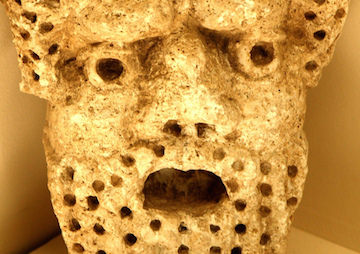Stone Tool Discovery Shows Culture Evolved Much Earlier Than Previously Believed
The major discovery in Africa of tools dating around 3.3 million years old has forced scientists to push back the standard dating of the dawn of culture by 700,000 years. An ancient depiction of a face (not one of the tools discovered in Kenya). (Alaskan Dude / CC BY 2.0)
An ancient depiction of a face (not one of the tools discovered in Kenya). (Alaskan Dude / CC BY 2.0)
The major discovery in Africa of stone tools dating around 3.3 million years old has forced scientists to push back the standard dating of the dawn of culture by 700,000 years.
The Guardian reports:
The discovery overturns the mainstream view that the ability to make stone tools was unique to our own ancestors and that it was one of a handful of traits that made early humans so special.
The new artefacts, found in Kenya’s Turkana basin, suggest that a variety [of] ancient apes were making similar advances in parallel across the African continent. …
Jason Lewis, of Stony Brook University in New York and a co-author, said: “The idea was that our lineage alone took the cognitive leap of hitting stones together to strike off sharp flakes and that this was the foundation of our evolutionary success. This discovery challenges the idea that the main characters that make us human, such as making stone tools, eating more meat, maybe using language, all evolved at once in a punctuated way, near the origins of the genus Homo.”
The question of what, or whom, might have made the tools remains a mystery, but fossils from around the same period found at the site provide some clues.
Read more here.
— Posted by Alexander Reed Kelly.
Your support matters…Independent journalism is under threat and overshadowed by heavily funded mainstream media.
You can help level the playing field. Become a member.
Your tax-deductible contribution keeps us digging beneath the headlines to give you thought-provoking, investigative reporting and analysis that unearths what's really happening- without compromise.
Give today to support our courageous, independent journalists.






You need to be a supporter to comment.
There are currently no responses to this article.
Be the first to respond.